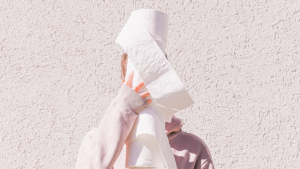by Amy Butler · July 5, 2020
Disclaimer: This blog has not been medically reviewed. The views expressed here are those of the writer and do not necessarily reflect those of The Lowdown or our medical team. For information about your contraception or the different methods available please check out our contraception pages.

Being a teenager is an exciting time for many. Maybe you meet your first partner, maybe you decide to have sex and maybe, because of this, you want to start using birth control. More often than not, most women choose the contraceptive pill as their first option, but for Amy Butler, she wanted to go onto the implant. However, as it turns out, the implant was not an option. Here, she tells The Lowdown about her contraceptive journey.
Finding the right pill
Amy decided to go onto birth control when she was 16 as she had met her first serious boyfriend and had started having sex. Plus, she wanted to tackle other issues that she had read hormonal contraception can often help with. Amy struggled with extremely painful periods and acne, and so was hoping contraception would be like a three-in-one.
Travelling down to her sexual health clinic was a pretty easy task and Amy had a pretty good idea how it all worked. She says, “I would often accompany friends (teenage girl moral support) and end up chatting to the sexual health nurses who would offer a lot of helpful advice.”
After supporting many friends through the process, Amy decided she would take the plunge and go for the implant. Many teenage girls try the pill as their first method of contraception and so it might have been unusual for Amy to choose the implant. She says most of her friends were a fan of the implant idea and so it felt like the best option. “The coil sounded like a horrific, painful procedure to me when I was 16 and the injection every three months seemed [like] far too much effort and upkeep.
“But by the time I was seen for an appointment, the clinic was closing for the day.” Instead, and to her surprise, the nurse suggested Amy starts a pill that contains similar hormones to the implant, instead of having to wait for another appointment. “I had preconceptions that the pill would be a bad idea, considering how forgetful I am, but she sounded like she knows what she was talking about so I went with it.” Amy is a pretty easy going person so even though she had initially opted for the implant, she was open to trying a different option.
“Any research went pretty much out the window when chatting with the nurse; leaving with the pill was definitely not something I anticipated,” she says.
Unfortunately, Amy almost instantly felt that this first pill was not right for her. She had only been taking it for a short while before side effects started to kick in. “I was on my period for a month, which is definitely not ideal when you first become sexually active with a nice new boyfriend.”
She adds, “I was also incredibly emotional (even more so than normal). If you ask any of my friends from college, they will testify that I was not a nice person to be around during that time.” Teenagers are usually moody anyway so add on the effects from the pill and Amy was certainly not herself.
“I wasn’t a nice person”
Not feeling comfortable at all, Amy went back to her sexual health clinic and told the nurse her symptoms. However, the nurse was reluctant to change her pill due to having to ‘wait it out for at least three months’. This is something a lot of females are told when they experience negative side effects from the birth control pill. Freya Cullinane, who shared her contraceptive journey with The Lowdown recently, said that she was made to feel like she had to wait out the bad side effects instead of moving onto something different.
Amy says, “But after a lot of insisting (and a fair bit of crying), they moved me onto Yasmin, a pill I have been on for the best part of six years and I am a big fan of.” Luckily for Amy, her spots cleared up and her periods became much lighter and less painful. “I do think I have a larger appetite when on the pill, which means my weight is slightly more difficult to control but not impossible.” Apart from that, Amy says she has had no negative side effects.
Six years and counting?
While the Yasmin pill has been practically perfect for Amy, she does admit her mental health has probably changed, but how, she could not tell you. This is because she has been on it for such a long time, that she can’t really tell now what difference it has made to her mood.
She admits she might well be a different person emotionally if she had never started that pill, but whether she would be happier or sadder she isn’t able to tell. “Unsurprisingly, like most women, I find that I am a lot more emotional around my period,” she explains. “However, the few months that I have been off the pill in the past, I haven’t noticed too much of a shift in my mental health and I think, on the whole, it [Yasmin pill] has not had any major negative or positive effects.”
She also says that how the pill has affected her physically is a bit of a mystery too. “When I came off the pill for around 3 months a few years ago, I started having pains and cramps (constantly, not just during my period).”
Is it just covering up problems I need to confront?
“After speaking to a gynaecologist, who could find no obvious reasons for the pain, he advised me to go back on the pill and since then the pains have been non-existent. She explains, “I suppose you could say that the pill has therefore improved my physical health, but sometimes I worry it is just covering up a problem that I should probably confront.”
Cuts, cuts and more cuts
Amy has been on this pill for a long time and trusts it a lot. She came off it for three months a few years ago and did the same at the start of this year, but that’s the only time she has been off it. While the Yasmin pill has worked fine, changing to something different has, of course, crossed her mind. “While I have seriously considered the coil, it seemed easier at the start of the pandemic to go back to a familiar and reliable contraception. Also, it has sorted my skin out again which has made me a lot happier and comfortable with myself.”
Amy reckons she will try the coil in the future, but not until Covid-19 is dealt with. “However, I find it a lot more difficult to get good advice these days – Sexual Health Clinics have been practically wiped out by NHS cuts. There’s now only one nearby and it’s a challenge to get seen unless you book far in advance. So, for now, while I can get Yasmin prescriptions easily through my GP, I am happy to stick with it.”
Sexual health clinics have faced serious cuts in the last few years. In 2018, several sexual health clinics faced closure or reduced hours as almost half the councils in England planned to cut spending. In a study conducted by The Kings Fund, between 2013/14 and 2017/18, total local authority spending on sexual health decreased by 14 per cent in real terms from £668 to £572 million. This includes spending on STI testing and treatment (down by 10 per cent to £364 million), contraception (down by 15 per cent to £161 million) and sexual health advice, prevention and promotion (down by an eye-watering 35 per cent to £47 million).
Elsewhere, according to a BBC investigation, of the 151 councils that responded to a BBC Freedom of Information request, 72 planned to cut sexual-health funding in 2018-19 compared with 2017-18. Most said any savings would be made through efficiencies, but 16 councils said services would be cut or reduced.
This of course has an impact on females getting contraception. Amy most likely isn’t the only one that feels she may as well just stay on the contraceptive she is on currently, instead of going through the potential hassle of finding another clinic. It’s likely there are many other females like Amy who experiences no significant changes to their health but who want to explore their options anyway. How much we know about being on one contraception for a long period of time is arguably still quite limited, therefore, it is understandable that many females feel like taking breaks and changing their birth control methods is sensible.
This blog is a part of The Lowdown’s My Contraceptive Journey series. Got an interesting contraception journey of your own? Get in touch with us via Instagram.
The views expressed here are those of the writer and do not necessarily reflect those of The Lowdown or our medical team. For information about your contraception or the different methods available please check out our contraception pages.








